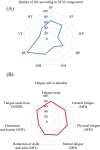The interplay between cognition, depression, anxiety, and sleep in primary Sjogren's syndrome patients
- PMID: 35915312
- PMCID: PMC9343365
- DOI: 10.1038/s41598-022-17354-1
The interplay between cognition, depression, anxiety, and sleep in primary Sjogren's syndrome patients
Abstract
Primary Sjögren's syndrome (pSS) is an autoimmune disease with frequent neurological involvement. Memory complaints are common, but their precise patterns remain unclear. We wanted to characterize patterns of neurocognitive profiles in pSS patients with cognitive complaints. Only pSS patients with memory complaints were included, prospectively. Cognitive profiles were compiled through a comprehensive cognitive evaluation by neuropsychologists. Evaluations of anxiety, depression, fatigue, sleep disorders and quality of life were performed for testing their interactions with cognitive profiles. All 32 pSS patients showed at least borderline cognitive impairment, and 17 (53%) exhibited a pathological cognitive profile: a hippocampal profile (37%), a dysexecutive profile (22%), and an instrumental profile (16%) (possible overlap). Regarding the secondary objectives: 37% of patients were depressed, and 48% exhibited a mild-to-severe anxiety trait. Sleep disorders were frequent (excessive daytime sleepiness (55%), high risk for sleep apnea (45%), and insomnia (77%)). Cognitive impairments could not be explained alone by anxiety, depression or sleep disorders. Fatigue level was strongly associated with sleep disorders. Our study highlights that cognitive complaints in pSS patients are supported by measurable cognitive impairments, apart from frequently associated disorders such as depression, anxiety or sleep troubles. Sleep disorders should be screened.
© 2022. The Author(s).
Conflict of interest statement
The authors declare no competing interests.
Figures



Similar articles
-
Sleep disordered breathing in patients with primary Sjögren's syndrome: a group controlled study.Sleep Med. 2012 Sep;13(8):1066-70. doi: 10.1016/j.sleep.2012.06.010. Epub 2012 Jul 25. Sleep Med. 2012. PMID: 22841036
-
[Investigation of sleep disturbance and related factors in patients with primary Sjögren's syndrome].Beijing Da Xue Xue Bao Yi Xue Ban. 2020 Dec 18;52(6):1063-1068. doi: 10.19723/j.issn.1671-167X.2020.06.012. Beijing Da Xue Xue Bao Yi Xue Ban. 2020. PMID: 33331314 Free PMC article. Chinese.
-
Increased risks of psychiatric disorders in patients with primary Sjögren's syndrome-a secondary cohort analysis of nationwide, population-based health claim data.Clin Rheumatol. 2019 Nov;38(11):3195-3203. doi: 10.1007/s10067-019-04705-z. Epub 2019 Aug 1. Clin Rheumatol. 2019. PMID: 31372849
-
Impact of pain on cognitive functions in primary Sjögren syndrome with small fiber neuropathy: 10 cases and a literature review.Medicine (Baltimore). 2017 Apr;96(16):e6384. doi: 10.1097/MD.0000000000006384. Medicine (Baltimore). 2017. PMID: 28422829 Free PMC article. Review.
-
Fibromyalgia, Sjogren's & depression: linked?Postgrad Med. 2020 Sep;132(7):575-580. doi: 10.1080/00325481.2020.1758426. Epub 2020 May 20. Postgrad Med. 2020. PMID: 32314938 Review.
Cited by
-
Central Nervous System Involvement in Primary Sjögren's Syndrome: Narrative Review of MRI Findings.Diagnostics (Basel). 2022 Dec 21;13(1):14. doi: 10.3390/diagnostics13010014. Diagnostics (Basel). 2022. PMID: 36611306 Free PMC article. Review.
-
Fatigue and sleep quality in Chinese adults with connective tissue disease: A cross-sectional study.Sleep Breath. 2024 Jun;28(3):1449-1457. doi: 10.1007/s11325-024-02993-7. Epub 2024 Jan 24. Sleep Breath. 2024. PMID: 38265629
-
Regional brain function study in patients with primary Sjögren's syndrome.Arthritis Res Ther. 2025 Apr 23;27(1):93. doi: 10.1186/s13075-025-03554-3. Arthritis Res Ther. 2025. PMID: 40270048 Free PMC article.
-
Sjögren's syndrome and Parkinson's Disease: A bidirectional two-sample Mendelian randomization study.PLoS One. 2024 Apr 3;19(4):e0298778. doi: 10.1371/journal.pone.0298778. eCollection 2024. PLoS One. 2024. PMID: 38568911 Free PMC article.
-
The Physical and Psychosocial Impact of Fatigue among Patients with Sjogren's Syndrome: A Systematic Review.J Clin Med. 2024 Mar 7;13(6):1537. doi: 10.3390/jcm13061537. J Clin Med. 2024. PMID: 38541763 Free PMC article. Review.
References
MeSH terms
LinkOut - more resources
Full Text Sources
Medical

